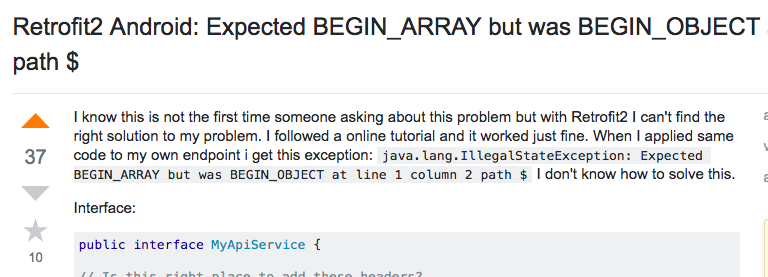We will be using retrofit,gson for parsing, so go to your app level build.gradle and add the following as dependencies
implementation 'com.squareup.retrofit2:retrofit:2.0.0-beta4'
implementation 'com.squareup.retrofit2:converter-gson:2.3.0'please add the latest dependency versions for retrofit, converter-gson
Hi, in this tutorial, we will parse the below json. Check this json here >> https://navneet7k.github.io/sample_object_array.json
 |
| Here you can see that the cars_array is wrapped inside another json object, so we will need two model/pojo classes |
1) Automatic model class/pojo class generation using http://www.jsonschema2pojo.org/
You can make use of jsonschema2pojo to covert json to java object online. This is a really effective tool which even supports various annotation types like jackson, gson, moshi etc.
- So, first of all, go to http://www.jsonschema2pojo.org/
- Paste the json https://navneet7k.github.io/sample_object_array.json in the box provided
 |
| Specify Target language as Java, Source Type as JSON and annotation style as Gson |
- Now click preview and copy the generated java files
 |
| Now copy the contents of the class and add it in android studio project |
SampleResponse.java
public class SampleResponse { @SerializedName("id") @Expose private String id; @SerializedName("type") @Expose private String type; @SerializedName("cars_array") @Expose private List<CarsArray> carsArray = null; public String getId() { return id; } public void setId(String id) { this.id = id; } public String getType() { return type; } public void setType(String type) { this.type = type; } public List<CarsArray> getCarsArray() { return carsArray; } public void setCarsArray(List<CarsArray> carsArray) { this.carsArray = carsArray; } }
CarsArray.java
public class CarsArray { @SerializedName("id") @Expose private String id; @SerializedName("name") @Expose private String name; @SerializedName("desc") @Expose private String desc; public String getId() { return id; } public void setId(String id) { this.id = id; } public String getName() { return name; } public void setName(String name) { this.name = name; } public String getDesc() { return desc; } public void setDesc(String desc) { this.desc = desc; } }
MainActivity.java
private void parseJson() { Retrofit retrofit = new Retrofit.Builder() .baseUrl("https://navneet7k.github.io/") .addConverterFactory(GsonConverterFactory.create()) .build(); RequestInterface request = retrofit.create(RequestInterface.class); Call<SampleResponse> call1=request.getJson(); call1.enqueue(new Callback<SampleResponse>() { @Override public void onResponse(Call<SampleResponse> call, Response<SampleResponse> response) { Toast.makeText(MainActivity.this,"Success! response for first item >> \n car :" +response.body().getCarsArray().get(0).getName()+"\ndesc :"+response.body().getCarsArray().get(0).getDesc(),Toast.LENGTH_SHORT).show(); } @Override public void onFailure(Call<SampleResponse> call, Throwable t) { Toast.makeText(MainActivity.this,"Failure",Toast.LENGTH_SHORT).show(); } }); }
RequestInterface.java
interface RequestInterface { @GET("sample_object_array.json") Call<SampleResponse> getJson(); }
Download free source code




